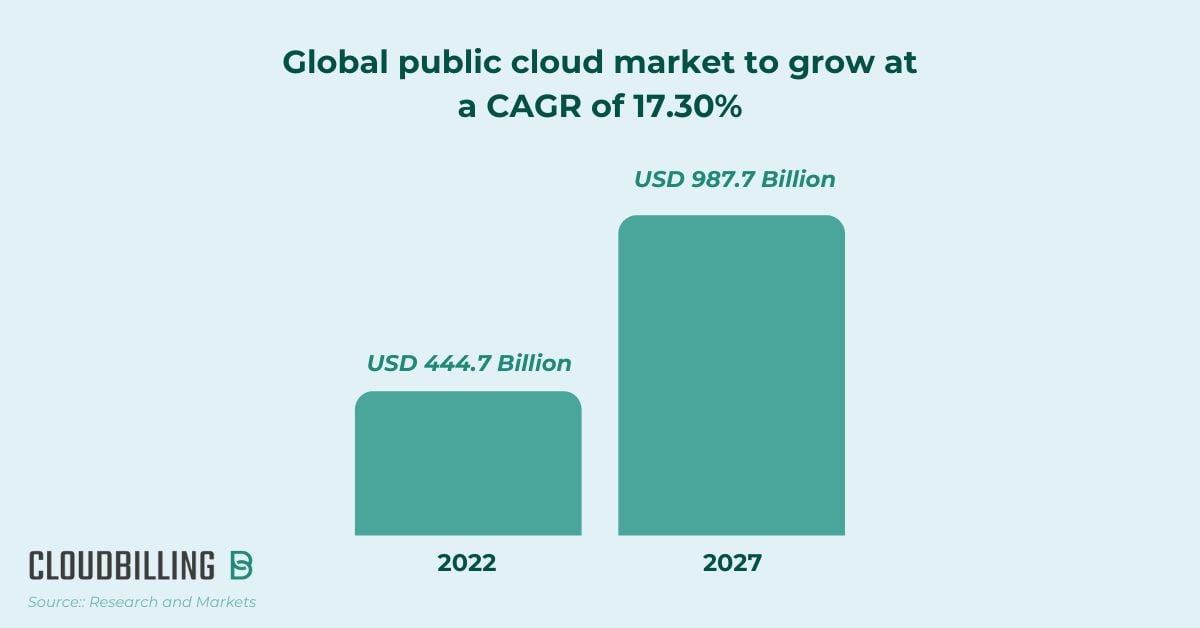
Contents
Ontvang de beste CloudBilling-content van de week
The world of cloud services is changing quickly. For example, the use of public cloud services is expected to grow by around 17% each year (see the global public cloud market graphic below). Service providers are embracing diverse cloud sources to offer an array of solutions to customers.

Moreover, customers’ demands are changing, asking for more transparency, value, and insights. It's not only about offering top-quality cloud services anymore; prioritising customer experience has become equally crucial.
As a cloud service provider, you need to adapt and change the way you have been delivering your services. Manage the complexity of the multi-cloud delivery model and start focusing on the experience you bring to your customers. In this development, the data collected across various facets of your operations may become crucial.
Nonetheless, many cloud businesses struggle when it comes to making the most of this data however, harnessing this data is a challenge many cloud businesses face. As you go through this process, you will encounter a range of challenges such as:
- Different data types and formats
- Changing API rules and technologies
- Varying service timeframes
- Inconsistent timing in itself
- The lack of data tagging
- Securing the data collection
There are more challenges to face before you can effectively use the data from your operations. In this article, we will inform you what value this data holds for you, and how you can collect and use it effectively.
The business problem: navigating the cloud landscape without data
The problem may seem clear. Delivering your services in the complex ecosystem of cloud services without leveraging data-driven insights can feel like navigating uncharted territory. Lack of visibility into various aspects of your cloud business impacts your:
- Cloud delivery and operation
- Customer growth opportunities
Your cloud delivery and data
The efficacy of employing data within your cloud delivery strategy is evident. Without gaining insights into your operations, you navigate without direction.
As an example, lacking insights into usage patterns could result in service providers either allocating excessive or insufficient resources, thereby incurring avoidable expenses or delivering subpar services. Likewise, possessing a comprehensive grasp of the cost implications tied to different cloud services empowers you to competitively price your offerings while maintaining a healthy profit margin.
Customer growth opportunities
The data in your cloud operations, coming from the different cloud platforms you may use, holds the usage patterns of your customers. Operational as well as financial. And this is the data your customers need.
Considering these challenges, it becomes clear that cloud enterprises must utilise data to steer their strategic expansion. Acknowledging the worth of this data marks the initial phase.
Data isn't solely a result of operations; it represents a valuable source of insights. Analysing this data can provide a deeper understanding of your business, customers, and market, enabling you to make informed decisions and drive strategic growth.
Unlocking the Power of Business Intelligence Tools for Maximum Potential
To fully leverage the power of the cloud and usage data involves you need to collect that data from various sources. Next to collecting, you need to clean and organise it, and then analyse it using business intelligence tools. By embracing automation you can turn these data sets into actionable insights. This can help you:
- Collect and organise your data effectively
As an example, in order to collect cloud usage data at Microsoft and AWS require completely different connections, timing, data formats, and structure. And both companies tend to change this structure frequently.
- Visualise your data, identify trends and patterns, and generate actionable insights
For example, by analysing usage data, you can determine which services are most popular with your customers and focus your resources on enhancing these services.
The importance of data in shaping your cloud insights is unmistakable. These invaluable insights hold the potential to yield both immediate and future advantages for your operations and customer base. But how do you initiate the process of collecting and effectively utilising this data?
How to collect data for your business intelligence in the cloud
The process of collecting, assembling, and presenting Business Intelligence data is complex. The number of different data sources and suppliers that most cloud providers use has turned this process into a very complex process. Roughly the process of gathering the data and creating valuable insights consists of:
- Connect with the different APIs and data points of your service sources
- Collect the data from these sources
- Analyse if the data is consistent, complete, and accurate
- Organize and combine the data based on your customers and time periods
- Perform analysis on the data based on preconfigured intelligence modules
A very important part in this data puzzle is the consistency of data tagging throughout your service sources. Specifically, the customer's identifier needs to be registered in all of these sources.
Another pitfall in this process is that providers tend to change their data sets and API rules frequently. Hence, the analysis of the data you collect is one of the most important steps in this process.
Business Intelligence Tools, like those offered by CloudBilling, can be instrumental in this process. These tools enable businesses to collect, organise, and analyse data, providing valuable insights to guide decision-making and strategy development.
This, in turn, allows companies to steer their cloud journey on a strategic level, responding proactive to market changes and customer needs and driving sustainable growth. An example of this effectiveness can be found in CloudBilling's success story with CloudNation, which shows how these tools have led to tangible results: Discover the success story here.
Conclusion
Data is a crucial guide in the complex and evolving cloud landscape. By effectively using this data, cloud businesses can navigate this landscape with increased confidence and clarity, making strategic decisions that drive growth and success.
Regardless of where you are on your cloud journey, there is always time to start leveraging the power of data. Remember, your data isn't just a by-product of your operations—it's a vital tool for strategic growth.
Ready to take your business to the next level by optimising your invoicing costs in the cloud? Find out how our solutions can maximise your efficiency. Reach out to us today for more information or get a free demo. Our dedicated team is here to assist you!








